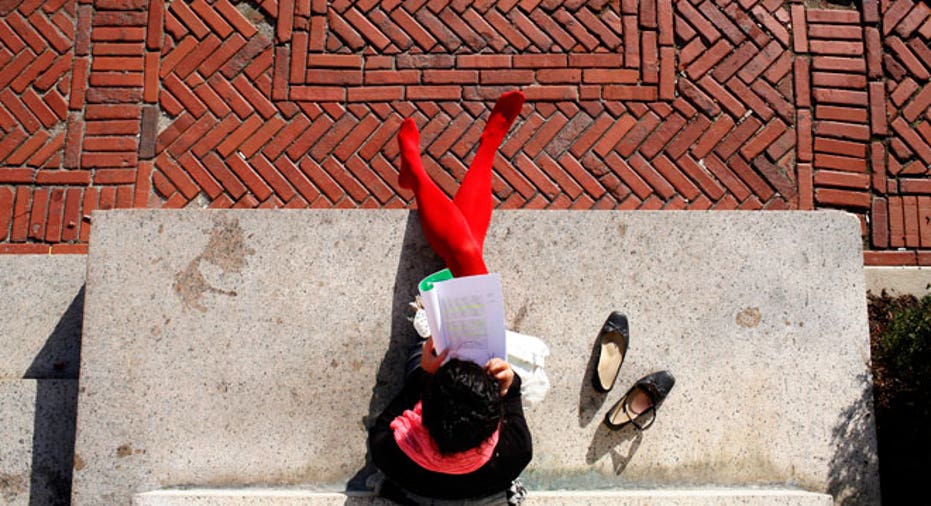4 Reasons Why College Kids Need a Credit Card

The thought of your baby going off to college is scary enough. Now picture him or her armed with a credit card!
As a parent, your instinct might be to shelter your young adults from the complicated world of credit (and its potential debt downside) as long as possible. But at some point, they will need to learn the ropes if they ever hope to buy a car, rent an apartment or own a home.
The key for new card users is to learn how to wield plastic responsibly and build a strong foundation for their financial future. "So many graduate college with their diploma in one hand, and credit card debt and student loans bills in the other," says Gail Cunningham, vice president of public relations of the National Foundation for Credit Counseling.
That's why parents need to help develop their child's financial maturity by introducing them to credit sometime during the college years. "With proper guidance and the right sort of planning and budgeting, opening that first credit card can be useful for young people to spend and budget responsibility," says Randy Hopper, vice president of credit cards at Navy Federal Credit Union.
One thing to note is that the Credit CARD Act of 2009 prohibits people under 21 from having their own credit card unless they earn income or have a co-signer on the card (usually Mom or Dad). If your teen does not work, keep in mind that going the co-signer route will put your credit on the hook for any debt that goes unpaid. As an alternative, you could add your child as an authorized user on one of your cards so you can closely supervise his or her spending. This could be a good practice step since you retain control of the account, and can choose to remove the authorized user at any time.
That being said, here are some reasons why college could be the perfect time for your child to give credit cards a try.
1. Building credit early has its advantages. Landlords, prospective employers and even cell phone providers may pull your credit report as part of a background check, but there won't be anything to see if someone has never managed a line of credit.
"Graduating with enough credit to compute a score will help in the young adult's favor," says Cunningham. "Every graduate wants to get rid of that old clunker and upgrade from their dorm room experience into an apartment at some point. Those adult actions are going to require a credit history." Responsible students should be working toward an end game -- moving out, buying their own car -- and all of that is going to take a positive credit file.
Entrepreneurial-minded young adults who might one day seek a small business loan will also need to have an established credit history. But just having a credit card isn't enough -- you have to use it and make payments on time in order to have evidence of responsible borrowing and repayment reflected on your credit report, says Hopper. "Start out small, by perhaps charging gas on the credit card, and then paying off the balance in full at the end of the month," he suggests.
2. A first credit card can be a teaching tool. Going over monthly statements can be a powerful way for parents to help their students monitor spending, says Cunningham. "You may start by holding their hands, but then move to looking over their shoulders, until finally they are responsible for their own credit actions," she says.
What you want to avoid is becoming an enabler by paying off bills if they rack up too much debt. Instead, you can minimize the amount of debt your teen can accumulate by starting off with a small credit line, say around $300-$500. "There's nothing wrong with asking the issuer to cut down the credit limit," says Hopper.
3. A credit card can offer peace of mind. Having a line of credit available can offer a layer of financial security should the student run into an emergency situation while far from home, says Cunningham. Whether it's a car breakdown, an unexpected medical visit or even having to spend more on books than was budgeted, parents can rest easy knowing their teen has credit at their disposal.
Of course, it's on the individual to know what constitutes a real emergency, warns Ornella Grosz, author of "Moneylicious: A Financial Clue for Generation Y." "It's easy to swipe the card and use the emergency excuse, but an all-inclusive trip with your friends, for instance, doesn't count," she says. In other words, talk to your child and go over some examples of when using credit in a pinch is OK so there are no misunderstandings or excuses.
4. Responsible credit use can come with rewards. If your college student is going to get a card, he or she should take advantage of cash back or other rewards programs, suggests Grosz. Note that these programs are best for those who pay off their balances in full each month.
Hopper suggests focusing on simple products when shopping around for a credit card. Start with those that have good rates and no fees, and if possible, then look into cards that offer cash rewards as an added bonus. Earning airline miles and other travel rewards might sound ideal for students who fly home a couple of times per year, he says, but it usually takes a significant amount of credit spending to earn enough points for a flight, and airline cards typically carry hefty annual fees.
By leveraging credit appropriately, says Grosz, college students can begin building a clean credit report and practicing smart financial habits that will help them achieve their future financial goals.
See related:
5 money tips for parents of new college students
6 simple credit lessons for college students



















